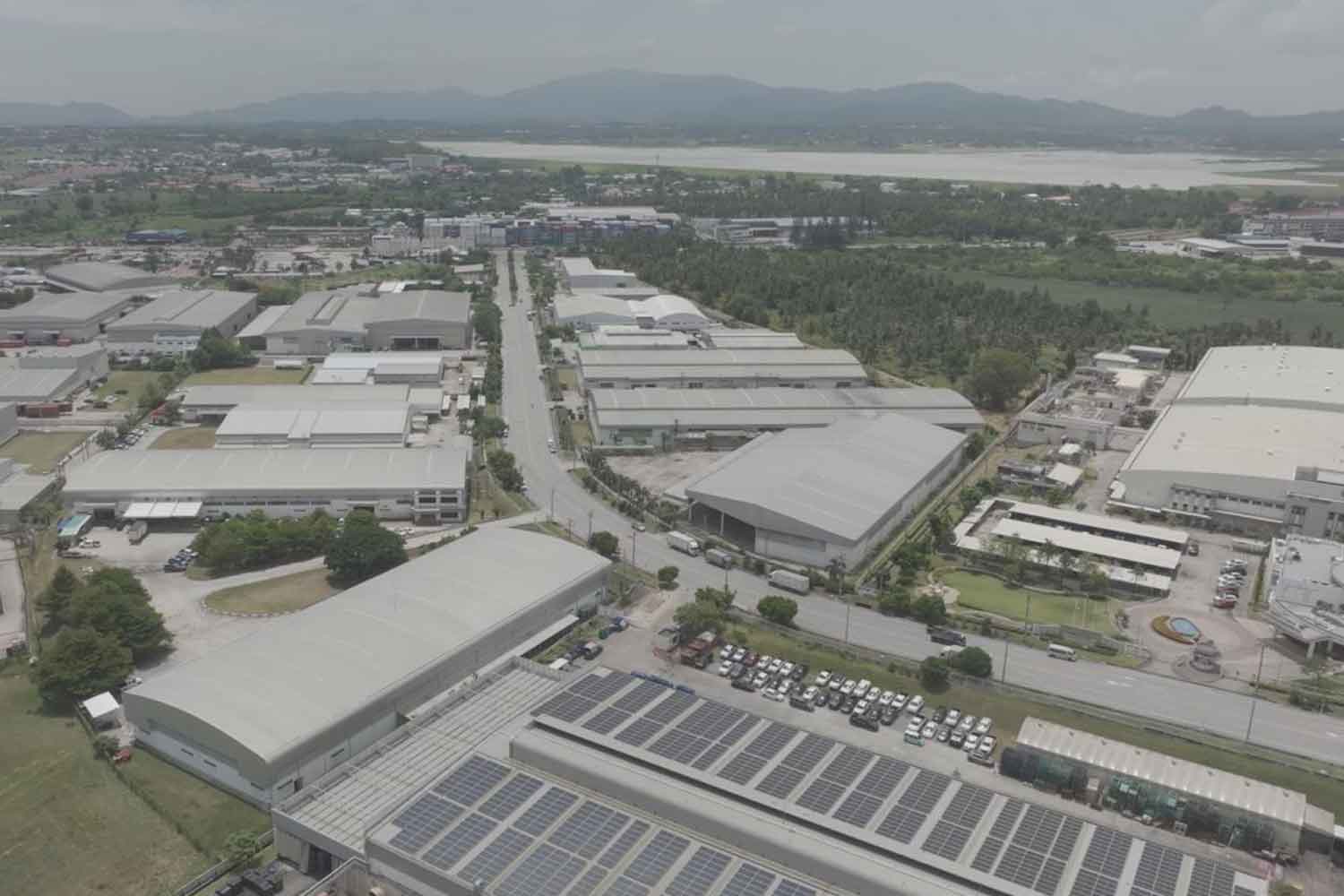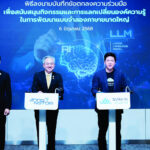AIM Group to inject 1.1 billion baht into AIMIRT for two projects, boosting total investment to 14.1 billion baht
An aerial view of Pinthong Industrial Park in Chon Buri serves as a backdrop to AIM Group’s ongoing expansion in Thailand’s industrial real estate sector. This year, AIM Group is set to invest an additional 1.1 billion baht into its AIM Industrial Growth Freehold and Leasehold Real Estate Investment Trust (AIMIRT), reinforcing its focus on premium industrial assets such as warehouses, factories, cold storage facilities, and liquid chemical tanks. This new commitment lifts AIMIRT’s cumulative investments to 14.1 billion baht, underscoring the group’s confidence in the long-term value of high-quality logistics and industrial facilities. At the same time, AIM Group is taking proactive steps to address financial headwinds in its AIMCG commercial property fund by seeking unitholder approval to convert leasehold assets into freehold ownership, a move aimed at enhancing asset control and potential liquidity. Across its two flagship REITs, AIM Group currently manages a portfolio of 19 real estate projects valued at more than 16 billion baht, reflecting a broad footprint in the Thai market and a diversified strategy across industrial and retail/hybrid properties. AIMIRT, which was established in December 2017 and is listed on the Stock Exchange of Thailand (SET), continues to emphasize premium industrial assets, with current assets under management reported at 13.1 billion baht. In the second half of this year, AIMIRT is planning to deploy another 1.1 billion baht into two strategic projects: an industrial warehouse facility in Rayong, a key industrial hub, and the expansion of the Pacific Cold Storage facility in Samut Sakhon, a province adjacent to Bangkok with significant logistics demand. AIMIRT’s resilience has been demonstrated through the Covid-19 pandemic, during which it maintained cost efficiency even during periods of high interest rates. Over a six-year horizon, the fund has delivered a total return of approximately 60% and a compounded annual growth rate (CAGR) of 29.5% since its inception, signaling durable performance in a volatile market. The second fund, AIMCG (AIM Commercial Growth Freehold and Leasehold REIT), was launched in July 2019 and is also listed on the SET. It currently manages assets worth 2.83 billion baht, including UD Town in Udon Thani, 72 Courtyard in Bangkok, the Porto Chino lifestyle mall in Samut Sakhon, and Noble Solo condominium in Bangkok.
Section 1: AIMIRT and AIM Group’s industrial real estate expansion
AIMIRT’s growth trajectory is anchored in its strategic focus on premium industrial assets that meet the evolving needs of modern logistics and manufacturing operations. Warehouses, factory spaces, cold storage facilities, and liquid chemical tanks form the core of its asset class, which aligns with the Thai market’s demand for high-quality, reliable infrastructure capable of supporting supply chains that are increasingly complex and time-sensitive. The decision to increase AIMIRT’s capital commitment by 1.1 billion baht in the current year reflects a deliberate confidence in the near- to medium-term growth prospects of Thailand’s industrial real estate segment. The infusion pushes AIMIRT’s total invested capital to 14.1 billion baht, a figure that underscores the fund’s scale and the management’s willingness to deploy substantial capital to capitalize on strategic opportunities. The company’s long-term vision is to sustain a robust portfolio that can weather macroeconomic fluctuations while delivering stable cash flows to unitholders.
AIMIRT’s listing on the SET since December 2017 has provided it with a platform to access capital and to showcase its emphasis on premium industrial assets. The fund’s current asset base under management stands at 13.1 billion baht, illustrating a diversified collection of assets designed to meet the needs of tenants ranging from industrial operators to logistics service providers. The two targeted projects for the 1.1 billion baht deployment in the second half of the year reflect a dual-pronged strategy: expanding capacity in Rayong’s industrial spaces and upgrading cold storage capabilities in Samut Sakhon, which is a major hub for Thailand’s seafood and food processing industries. The Rayong project represents a continuation of Rayong’s status as a hotbed of manufacturing and logistics activity, while the Samut Sakhon cold storage expansion responds to rising demand for temperature-controlled warehousing to preserve perishables and temperature-sensitive goods.
AIMIRT’s historical performance, including a demonstrated ability to maintain cost efficiency during the Covid-19 pandemic and periods of rising interest rates, highlights the resilience of its operating model. The fund’s six-year performance — delivering around a 60% total return and a 29.5% compound annual growth rate since inception — indicates sustained value creation for investors through disciplined asset selection, effective cost management, and a focus on long-term lease structures. The emphasis on long-term leases aligns with AIM Group’s broader risk management philosophy, which prioritizes predictable cash flows and the ability to withstand cyclical volatility by relying on stable tenant bases and robust contractual terms. In sum, AIMIRT’s ongoing capital deployment, supported by a track record of resilience and outsized returns, positions it to capitalize on the growth of Thailand’s industrial real estate sector while maintaining a focus on quality, sustainability, and prudent governance.
Section 2: AIMCG’s challenges and strategic responses, including Porto Chino
By contrast, AIMCG — the Commercial Growth Freehold and Leasehold REIT launched in July 2019 and listed on the SET — encompasses a portfolio that includes notable urban retail and mixed-use assets such as UD Town in Udon Thani, 72 Courtyard in Bangkok, the Porto Chino lifestyle mall in Samut Sakhon, and Noble Solo condominium in Bangkok. AIMCG currently manages assets worth 2.83 billion baht, reflecting a diversified exposure across retail, lifestyle, and residential sectors in key Thai markets. However, the fund has faced a set of challenges arising largely from timing and macroeconomic conditions that impacted asset performance. According to Tanadech Opasayanon, the co-managing director of AIM REIT Management, AIMCG acquired properties near market peaks just before the onset of the Covid-19 pandemic. This timing means that several flagship assets, notably Porto Chino and UD Town, have underperformed given the economic disruptions and structural headwinds that have affected consumer traffic and retail revenue.
Porto Chino, a lifestyle mall located in Samut Sakhon and owned by D-Land Property, is emblematic of the issues confronting AIMCG. The asset, valued at approximately 900 million baht, has seen revenue efforts challenged by a sharp drop in shopper footfall during the pandemic’s peak and subsequent infrastructure bottlenecks along Rama II Road. The gap between projected and actual revenue generation culminated in a default on revenue payments totaling over 100 million baht, underscoring the stress placed on the asset and, by extension, on AIMCG’s portfolio performance. The Rama II Road corridor, a critical artery for the area, has experienced infrastructure issues that have compounded the challenges for merchants and developers in the Porto Chino vicinity.
In light of these pressures, AIM Group is pursuing a structural remedy aimed at stabilizing asset ownership and improving liquidity options. The proposed solution involves converting Porto Chino’s unit ownership structure from leasehold to freehold. If approved by unitholders, this conversion would grant AIMCG direct ownership rights, enabling more flexible asset management and potentially facilitating a strategic sale once the Rama II Road improvements are completed and traffic patterns recover. The conversion would also align the asset with a more straightforward transferability profile, reducing encumbrances associated with leasehold arrangements and potentially unlocking longer-term value through enhanced flexibility in leasing terms, asset repositioning, or strategic divestment.
Mr. Tanadech has emphasized that the broader investment environment has become increasingly volatile, necessitating a prudent approach to capital allocation. The group’s strategic stance is to pursue investments with long-term lease horizons, ideally 10 years or more, complemented by tenants with strong financial fundamentals and brand recognition. The aim is to secure stable cash flows that can sustain distributions and mitigate downside risks in the face of macroeconomic uncertainty. This conservative approach underscores the importance of durable tenant covenants and a diversified asset mix that can weather periods of slower economic growth or consumer sentiment weakness. The Porto Chino case illustrates how asset-level challenges can ripple through a REIT’s performance, prompting governance-led strategies to recalibrate ownership structures and asset management approaches in ways that preserve value for unitholders.
The strategic conversation around Porto Chino also reveals the group’s willingness to pursue proactive asset optimization in the face of headwinds. By moving toward freehold ownership, AIMCG seeks to gain greater control over the asset’s future development trajectory and cash flow profile. This could enable more aggressive asset management maneuvers, such as targeted renovations, re-tenanting at premium rates, or even revisiting the project’s overall design and usage mix to align with emerging consumer preferences and traffic patterns post-pandemic. In essence, the Porto Chino initiative reflects a broader pattern in AIM Group’s approach: when faced with market dislocation or underperformance, the firm weighs structural changes that improve asset-level resilience and unlock value in the longer term.
Section 3: Management’s outlook, governance, and strategic pivots for 2025
AIM Group’s leadership has articulated a forward-looking agenda designed to strengthen asset quality, diversify income streams, and position the company for growth in a shifting macro environment. Tanadech Opasayanon, co-managing director of AIM REIT Management, has underscored the importance of a disciplined investment philosophy in the current climate. He notes a pragmatic emphasis on long-duration leases, financially robust tenants, recognizable brands, and consistent cash flows as essential ingredients for delivering stable returns and reducing exposure to long-term risk. This stance is particularly salient given the volatility observed in interest rates and global trade conditions, which can have outsized effects on both leasing metrics and capital market sentiment. The emphasis on tenured leases helps to insulate the portfolio from short-term fluctuations in rental rates and occupancy levels, ensuring predictable distributions and a more reliable path to value creation for unitholders.
Looking ahead to 2025, AIMIRT is charting a strategy that blends rebranding, ESG integration, ongoing investment, and expansion into new infrastructure sectors. The company’s leadership envisions an enhanced brand narrative and improved stakeholder engagement as part of its growth playbook. ESG integration is expected to permeate investment decisions, asset management practices, and reporting frameworks, reflecting a broader commitment to sustainable operations and governance standards that resonate with tenants, investors, and regulators alike. This commitment to ESG, alongside continued capital allocation to high-quality industrial assets, signals a deliberate shift toward a more resilient portfolio that can better withstand macroeconomic shocks and structural shifts in the global supply chain.
In parallel with these strategic pivots, AIM Group expanded its internal capabilities by launching AIM Infinite (AIMINF), a new independent financial advisory arm introduced earlier in the year. The objective of this arm is to diversify income streams and broaden the range of services available to stakeholders, thereby enriching the firm’s value proposition beyond traditional REIT management. Charasrit Voravudhi, chief executive of AIM Group, discussed the rationale for this diversification move. He framed AIMINF as a strategic response to the challenging capital market environment, characterized by rising interest rates and ongoing trade tensions that have intensified volatility across sectors such as hospitality REITs and office rentals, which continue to face revenue headwinds. The creation of AIMINF is presented as a means to broaden revenue sources and provide more comprehensive advisory capabilities that can support investors and tenants navigating a complex market.
Charasrit also acknowledged that the second half of the year presents a set of macro-financial and geopolitical dynamics that will shape the industrial real estate sector’s performance. Domestic economic conditions, coupled with global trade tensions, are expected to be decisive factors in how well industrial assets perform over the next several quarters. Retail real estate remains particularly vulnerable to a weak economic outlook, a reality that has informed the management’s cautious stance on asset selection and development activity. In this context, fund managers are placing heightened emphasis on securing long-term tenants with strong financials—tenants who can sustain stable rental income across the portfolio and mitigate long-term risk. This approach reflects a broader industry trend toward tenant creditworthiness and lock-in contracts that can ensure more predictable distributions in the face of economic volatility.
Section 4: Portfolio health, performance metrics, and risk management
The portfolio health of AIM Group’s REITs is closely tied to asset quality, tenancy mix, and the ability to navigate external shocks. The two-REIT strategy provides a diversified exposure across industrial and commercial real estate, a combination designed to balance growth opportunities with income stability. Core to this strategy is the emphasis on assets with clear, long-term value propositions. The company’s focus on premium industrial assets—especially those with scalable logistics capabilities and temperature-controlled storage—positions AIMIRT to benefit from ongoing shifts in supply chain configurations and e-commerce growth, both of which require sophisticated warehousing and cold storage infrastructure. The company’s cost discipline during periods of high interest rates has been a notable feature of its operating model, contributing to resilience during the Covid-19 period and beyond.
In addition to the asset-level strategies, AIM Group’s governance approach—particularly with respect to asset conversion decisions like the Porto Chino leasehold-to-freehold proposal—reflects a disciplined framework for maximizing value while maintaining prudent risk controls. The proposed conversion aligns asset control with long-run value realization, enabling more flexible management and potentially easing future monetization through sales or redevelopment as market conditions warrant. This governance mindset mirrors the broader objective of maintaining financial stability and protecting unitholder value through careful assessment of timing, market conditions, and capital allocation decisions.
From a performance perspective, AIMIRT’s six-year trajectory—marked by a cumulative total return around 60% and a 29.5% CAGR since inception—illustrates the fund’s capacity to compound value over time through prudent asset selection, portfolio diversification, and active management. While such performance is contingent on macroeconomic stability, the track record provides a basis for evaluating the expected long-term returns of its industrial assets, particularly in an environment where logistics and industrial real estate demand remains robust in many parts of Southeast Asia. AIM Group’s broader strategy to diversify income streams via AIMINF also suggests a recognition that revenue sources beyond traditional rent streams can contribute to overall resilience and growth, especially when confronted with cyclical volatility in specific sectors of the real estate market.
Section 5: Market context, sector drivers, and risk factors
The industrial real estate sector in Thailand is influenced by a confluence of domestic economic dynamics, global trade patterns, and infrastructural developments. The second half of the year is anticipated to hinge on domestic economic conditions and ongoing global trade tensions, which will shape industrial asset performance. Retail real estate, by contrast, may exhibit vulnerability in light of a weak economic outlook, underscoring the need for a balanced portfolio that can weather sector-specific headwinds. Against this backdrop, AIM Group’s emphasis on long-term lease commitments from financially stable tenants with well-known brands aligns with a risk-averse posture designed to sustain recurring income streams even when macro indicators soften.
Infrastructure and logistical improvements in the region are critical external factors affecting asset values and occupancy. The Rama II Road upgrades, for instance, have the potential to influence consumer traffic patterns, accessibility, and the attractiveness of nearby retail and mixed-use developments. While improvements may take several years to complete, the anticipated long-term benefits—reduced accidents, improved traffic flow, and enhanced visibility for surrounding real estate—could bolster property values and enable more ambitious redevelopment strategies once completed. AIM Group’s proactive stance on converting Porto Chino to a freehold model reflects a strategic assessment of how infrastructure improvements, traffic patterns, and consumer behavior converge to determine asset performance over the medium to long term.
The group’s focus on securing long-duration leases (10 years or more) with financially stable tenants is a core risk management tactic. Long-tenured leases reduce turnover risk and provide more predictable cash flows, an essential element in maintaining distributions during periods of economic volatility. Tenants with well-established brands and strong balance sheets contribute to portfolio resilience, helping to offset potential declines in occupancy or rental rates in softer market conditions. In addition, the diversification across sectors—industrial assets through AIMIRT and retail/hybrid assets through AIMCG—creates a buffer against sector-specific downturns, enabling the group to leverage cross-portfolio synergies and optimize capital allocation across opportunities with differing demand drivers.
Section 6: Asset management tactics, ESG, and growth ambitions
AIM Group’s asset management approach encompasses both operational excellence and strategic repositioning to maximize value. The Rayong industrial warehouse facility and the Samut Sakhon Pacific Cold Storage expansion illustrate a proactive asset-level strategy designed to capture rising demand for modern, efficient logistics spaces and cold storage capabilities. The ability to scale cold storage capacity aligns with Thailand’s growing appetite for perishables and food processing supply chains, where temperature-controlled environments are critical to preserving quality and extending shelf life. Such projects not only expand capacity but also enhance the quality profile of AIMIRT’s portfolio, enabling the fund to command competitive rents from high-quality tenants and maintain robust occupancy.
ESG integration and strategic branding form a central pillar of the 2025 plan for AIMIRT. ESG considerations are increasingly central to investment decision-making, tenant relationships, and investor perception. By integrating ESG practices into asset operations, the fund can improve energy efficiency, reduce operating costs, and enhance tenant satisfaction, while demonstrating a commitment to sustainable development that resonates with institutional investors and the broader market. In parallel with ESG integration, AIMIRT’s rebranding efforts aim to articulate a refreshed value proposition to investors, tenants, and other stakeholders, reinforcing the fund’s position as a leading partner for modern logistics and industrial development in Thailand.
The AIM Infinite (AIMINF) advisory arm adds another layer to the group’s growth ambitions. By broadening advisory capabilities, AIM Group seeks to diversify income sources beyond traditional REIT management through independent financial advisory services. This strategic expansion is designed to complement the core REIT business by offering value-added services to stakeholders, potentially attracting new investors and deepening relationships with existing ones. Charasrit Voravudhi emphasized that the advisory arm is part of the broader response to market volatility, enabling the group to withstand disruptions in capital markets while supporting clients through complex investment decisions.
Section 7: Strategic implications for investors and stakeholders
For investors and stakeholders, AIM Group’s multifaceted strategy offers several implications. The incremental investment into AIMIRT signals ongoing confidence in the Thai industrial real estate market and a belief in the enduring demand for high-quality logistics and cold storage facilities. The plan to pursue freehold conversions for select assets, such as Porto Chino, can be viewed as an effort to improve asset liquidity and management flexibility, albeit with the need to secure unitholder approval and to navigate the complexities associated with changing ownership structures. The emphasis on long-term leases and financially stable tenants signals an anticipation of steady revenue streams that can support distributions, particularly in an environment of rising interest rates and uncertain macro fundamentals.
The introduction of AIMINF provides investors with additional diversification options and advisory capabilities, potentially shielding the group from pure REIT risk by offering alternative sources of income. The ESG emphasis and the 2025 rebranding agenda align with broader market expectations for sustainable investing and transparent governance, which can contribute to stronger investor confidence and a broader pool of potential capital providers. For tenants, the focus on premium industrial spaces, modern logistics facilities, and robust property management contributes to a more favorable operating environment, creating mutually beneficial relationships that support long-term occupancy and stable rent collection.
Section 8: Conclusion
As AIM Group navigates a year characterized by higher financing costs, geopolitical tensions, and a shifting retail landscape, its dual-REIT strategy remains central to its growth narrative. AIMIRT’s continued capital deployment into Rayong and Samut Sakhon, combined with a disciplined emphasis on long-term leases and asset quality, positions the fund to capitalize on structural drivers in Thailand’s logistics and industrial sectors. The underperformance challenges faced by AIMCG, particularly around Porto Chino, have prompted a proactive strategic response aimed at enhancing asset ownership structures and unlocking value through freehold conversion when feasible. This approach reflects a broader governance-driven effort to balance risk, optimize asset performance, and protect unitholder value amid a complex economic backdrop.
Looking ahead, AIM Group’s leadership is focused on a multi-pronged strategy that includes rebranding, ESG integration, ongoing investments in industrial assets, and expansion into new infrastructure sectors. The launch of AIMINF marks a meaningful step toward diversifying income sources and strengthening stakeholder engagement, while the emphasis on long-term tenant commitments and conservative investment principles signals a prudent approach to capital allocation in an environment of rising rates and volatile trade dynamics. The combined effect of these initiatives suggests that AIM Group intends to build a resilient, diversified platform capable of delivering sustainable performance across market cycles, with a clear emphasis on quality assets, disciplined risk management, and strategic flexibility to adapt to evolving market realities. As Rama II Road improvements anticipate longer-term benefits for nearby assets, and as the industrial sector continues to evolve in response to global and domestic factors, AIM Group’s strategy remains centered on maximizing value through high-quality, income-generating assets, robust governance, and strategic diversification that enhances long-term investor confidence.



